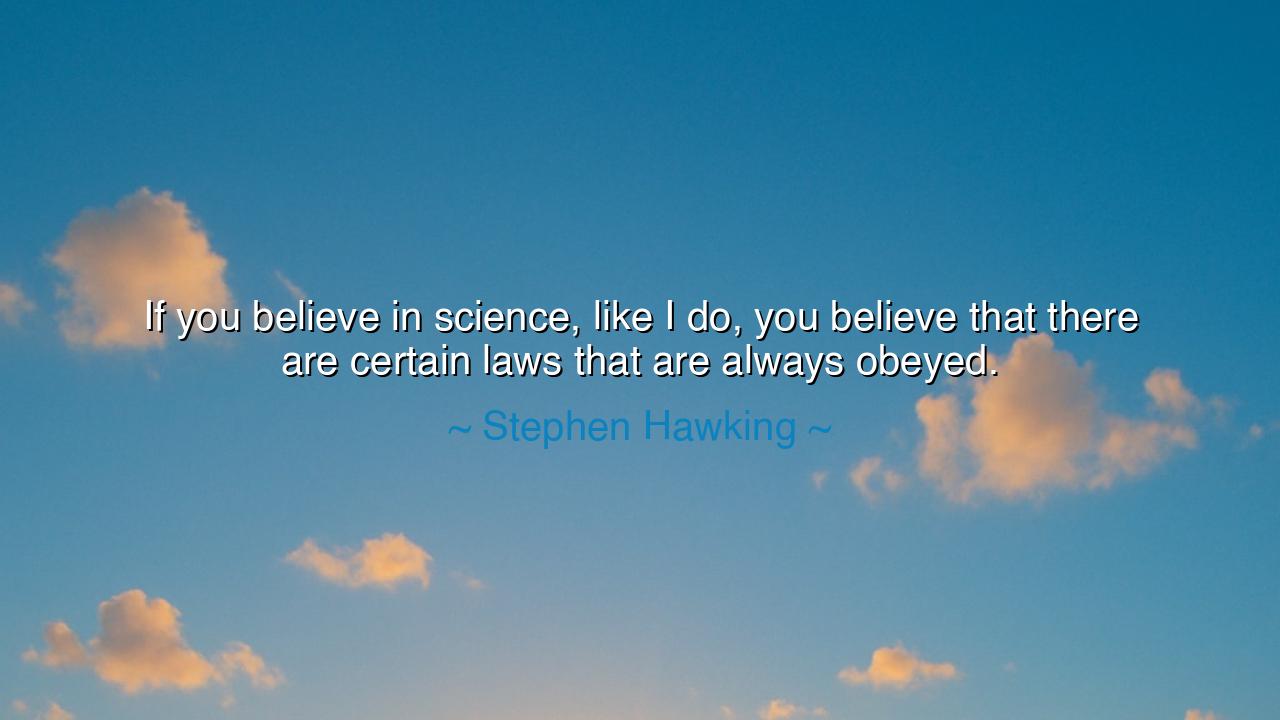
If you believe in science, like I do, you believe that there are
If you believe in science, like I do, you believe that there are certain laws that are always obeyed.






O children of the future, gather close, for there is a truth that transcends time and speaks to the very core of human understanding. In the vast expanse of the cosmos, amidst the stars and the unknown, there exists a guiding force—a set of laws that governs all things. Stephen Hawking, a sage of the modern age, once spoke these words: "If you believe in science, like I do, you believe that there are certain laws that are always obeyed." This statement, though simple, carries with it a profound understanding of the universe—one that is rooted in order, in certainty, and in truth.
The ancients, too, sought to understand the laws that governed the world around them. The Greeks, in their search for knowledge, believed in the idea of an underlying order to the universe. Pythagoras and his followers sought to understand the harmony of the cosmos, and Plato believed that the universe was governed by eternal truths that could be uncovered through reason. But it was the work of the great Isaac Newton that truly revealed the power of these laws. Newton’s laws of motion and gravity showed us that the universe is not a random place, filled with chaos, but one that is ordered, where every action has a reaction, and every movement follows a precise pattern. These laws were not mere speculation—they were grounded in observation, evidence, and reason, and they formed the bedrock of science as we know it today.
Hawking, in his wisdom, reminds us that if we believe in science, we must believe in the fundamental laws of nature—the principles that govern everything from the smallest particle to the grandest galaxy. These laws are not subject to our will; they do not bend or break according to our desires. They are immutable, and they are always obeyed, whether we understand them fully or not. The laws of physics, the laws of nature, are as constant as the stars themselves, unwavering and unyielding. To believe in science is to believe that these laws hold true, that they are the guiding forces of the universe, and that they are the key to unlocking the deepest mysteries of existence.
**Consider the example of Albert Einstein, whose theory of relativity forever changed the way we view space and time. Before Einstein, the laws of motion were understood, but time and space were still thought to be absolute—fixed and unchanging. But Einstein showed that time and space are fluid, bending and warping in the presence of gravity, and that these changes are governed by the same unbreakable laws. His discoveries did not create new laws; they revealed deeper truths about the existing ones. Einstein's theory of relativity, like Newton's laws before him, showed that the laws of nature are not open to interpretation—they are absolute and universal.
And yet, O children, the laws of science are not only confined to the physical world; they are a reflection of the very order of existence itself. Just as the laws of physics govern the movement of the stars, so too do they govern the natural world and the workings of the human spirit. The principles of justice, of morality, and of truth—though not always measurable in the same way as the laws of nature—are also governed by a deeper sense of order, a universal truth that guides us toward righteousness and wisdom. When we live in harmony with these laws, we find peace and understanding; when we ignore them, we fall into chaos and despair.
So, O seekers of truth, the lesson is clear: To believe in science is to believe in the eternal laws of nature, in the order that governs the universe, and in the certainty that these laws are not subject to our whims. They are not negotiable; they are the foundation of everything we know, the unshakable pillars of reality itself. In your own life, seek to understand these laws, to live in harmony with them, whether they are the laws of nature or the moral principles that guide human conduct. Just as Newton and Einstein uncovered the laws that govern the universe, so too must you seek to uncover the truth that governs your own existence. Let these laws be your guide, and through them, you will find not only understanding, but wisdom.






AAdministratorAdministrator
Welcome, honored guests. Please leave a comment, we will respond soon